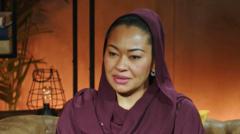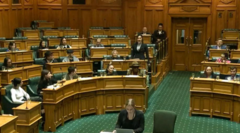**The controversy sheds light on the intersection of political power, gender issues, and legal accountability in Nigeria.**
**Nigerian Government Takes Legal Action Against Senator Over Assassination Allegations**

**Nigerian Government Takes Legal Action Against Senator Over Assassination Allegations**
**Senator Natasha Akpoti-Uduaghan faces charges from the Nigerian government following her claims against prominent politicians.**
In a shocking turn of events, the Nigerian government has filed legal charges against senator Natasha Akpoti-Uduaghan after she accused high-profile politicians, including Senate President Godswill Akpabio and former governor Yahaya Bello, of plotting to assassinate her. The accusations raised significant public interest and controversy, particularly as they followed her earlier claims of sexual harassment against Akpabio, which he has categorically denied.
The attorney general's office formally submitted the charges in the High Court, asserting that Akpoti-Uduaghan's allegations of assassination were defamatory and could endanger the reputations of both Akpabio and Bello. Detailed in the charge sheet, an interview broadcasted by Channels TV supports the government's claims, wherein Akpoti-Uduaghan referred to alleged discussions between Akpabio and Bello about her elimination.
In the wake of her sexual harassment accusations, Akpoti-Uduaghan faced suspension from the Senate for six months without pay, a decision critics attribute to her allegations against Akpabio rather than her conduct. The Senate's ethics committee cited her behavior as "unruly and disruptive" during debates, raising questions about the treatment of women in political environments and the support systems available for whistleblowers.
As this legal battle unfolds, it highlights ongoing issues of gender dynamics, power relationships, and the challenges faced by female politicians in Nigeria. Akpoti-Uduaghan has yet to publicly respond to the latest charges from the government, leaving many to speculate about the implications of this case for political accountability and women's rights in the country.
The attorney general's office formally submitted the charges in the High Court, asserting that Akpoti-Uduaghan's allegations of assassination were defamatory and could endanger the reputations of both Akpabio and Bello. Detailed in the charge sheet, an interview broadcasted by Channels TV supports the government's claims, wherein Akpoti-Uduaghan referred to alleged discussions between Akpabio and Bello about her elimination.
In the wake of her sexual harassment accusations, Akpoti-Uduaghan faced suspension from the Senate for six months without pay, a decision critics attribute to her allegations against Akpabio rather than her conduct. The Senate's ethics committee cited her behavior as "unruly and disruptive" during debates, raising questions about the treatment of women in political environments and the support systems available for whistleblowers.
As this legal battle unfolds, it highlights ongoing issues of gender dynamics, power relationships, and the challenges faced by female politicians in Nigeria. Akpoti-Uduaghan has yet to publicly respond to the latest charges from the government, leaving many to speculate about the implications of this case for political accountability and women's rights in the country.






















